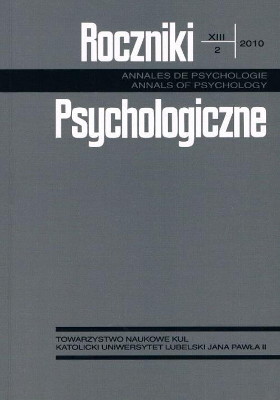On an attempt at constructing a meta-psychology. Adrian van Kaam post mortem
Abstract
The recently deceased Adrian van Kaam CSSp is considered to be one of the founders of phenomenologico-existential approach in psychology. His works stand at the beginning of humanist and existential psychology in the United States. Dialogue between psychology and philosophy, one of his postulates, is a common characteristic of this period in the development of psychology. While similar to V. Frankl’s multi-dimensional anthropology, Van Kaam’s research project appears to have been much more ambitious. His aim was to construct a meta-theoretical foundation for all the essentially different psychological currents in order to enable fruitful dialogue among them. However, Van Kaam’s proposal was not welcomed enthusiastically by the psychological community, and the author himself remains unknown to the general public, being only occasionally mentioned in manuals of the history of psychology. This paper is an attempt to provide the Polish audience with a more exhaustive presentation of van Kaam’s scientific heritage in the fields of psychological theory, psychotherapy, and scientific spirituality as well as to explain why his research has not become an integral part of the history of psychology.
References
Allport, G. W. (1964). Personality and social encounter. Boston: Beacon Press.
Anderson, J., Eppard, J. (1998). Van Kaam's Method Revisited. Qualitative Health Research, 8, 3, 399-403.
Brentano, F. (1995). Psychology from an Empirical Standpoint. London: Routledge.
Buber, M. (1954). Die Schriften über das dialogische Prinzip. Heidelberg: Verlag Lambert Schneider.
Burston, D. (2008a). Adrian van Kaam (1920-2007). Humanistic Psychologist (Jan), 36, 1, 90-91.
Burston, D. (2008b). Adrian van Kaam. Existential analysis. Journal of the Society for Existential Analysis (Jan), 19, 1, 176-177.
Frankl, V. E. (1970). Redukcjonizm. Więź, 9, 3-14.
Frankl, V. E. (1971). Homo patiens. Warszawa: PAX.
Frankl, V. E. (1974). Der unbewußte Gott. München: Kösel-Verlag.
Giorgi, A. (1970). Psychology as a human science. New York: Harper and Row.
Giorgi, A. (1991). Psychologia jako nauka humanistyczna w świetle założeń podejścia fenomenologicznego. W: A. Januszewski, Z. Uchnast, T. Witkowski (red.), Wykłady z psychologii w KUL (t. 5, s. 309-344). Lublin: RW KUL.
Giorgi, A. (2002). Psychologia jako nauka empiryczna uprawiana z ludzkiej perspektywy. Podejście fenomenologiczne. Białystok: TransHumana.
Hall, C. S., Lindzey, G. S. (1990). Teorie osobowości. Warszawa: PWN.
Heidegger, M. (1962). Being and time. New York: Harper & Row.
Hermans, H. J. M., Hermans-Jansen, E. (2000). Autonarracje: tworzenie znaczeń w psychoterapii (tłum. P. Oleś). Warszawa: Pracownia Testów Psychologicznych PTP.
Hermans, H., Kempen, H. (1993). The dialogical self: Meaning as movement. San Diego: Academic Press.
Husserl, E. (1973). Pariser Vorträge. The Hague, Netherlands: Martinus Nijhoff.
Jakubik, A. (1989). Podstawowe kierunki psychiatrii dynamicznej. Warszawa: PZWL.
Kreuch, T. J. (1983). Adrian van Kaam’s psychology and religious personality model. Journal of Psychology and Christianity, 2, 39-50.
Maslow, A. H. (1954). Motivation and personality. New York: Harper & Bros.
Maslow, A. H. (1962). Toward a psychology of being. Princeton-New York: D. Van Nostrand, Co.
Misiak, H., Sexton, V. S. (1966). History of psychology: An overview. New York: Grune & Stratton.
Muto, S. A., Martin, F. (2009). Portrait of Adrian van Kaam and humanistic psychology. Journal of Humanistic Psychology (Jul), 49, 3, 355-375.
Oleś, P. K. (2003). Wprowadzenie do psychologii osobowości. Warszawa: Scholar.
Popielski, K. (1994). Noetyczny wymiar osobowości. Lublin: RW KUL.
Rogers, C. R. (1961). On becoming a person. Boston: Houghton Mifflin Company.
Sikorska, K., Trzópek, J. (1999). Narodziny psychologii egzystencjalnej i jej związki z innymi kierunkami w psychologii. W: M. Opoczyńska (red), Wprowadzenie do psychologii egzystencjalnej (s. 79-128). Kraków: UJ.
Uchnast, Z. (1983). Humanistyczna orientacja w psychologii osobowości. Lublin: RW KUL.
Van Kaam, A. L. (1966a). Personality fulfillment in the spiritual life. Pennsylvania: Dimension Books.
Van Kaam, A. L. (1966b). The art of existential counseling. Wilkes-Barre, Pennsylvania: Dimension Books.
Van Kaam, A. L. (1969). Existential foundations of psychology. Garden City-New York: Image Books.
Van Kaam, A. L. (1983a). Foundations for personality study: An Adrian van Kaam reader. Den- ville, NJ: Dimension Books.
Van Kaam, A. L. (1983b). Fundamental formation: Formative spirituality 1. New York: Crossroad.
Van Kaam, A. L. (1985). Formative spirituality 2: Human formation. New York: Crossroad.
Van Kaam, A. L. (1986). Formation of the human heart: Formative spirituality 3. New York: Crossroad.
Van Kaam, A. L. (1964). Religion and personality. Englewood Cliffs, New Jersey: Prentice-Hall, Inc.
Walters, A. (1954). Contemporary personality theory. W: M. B. Arnold, J. A. Gasson (red.), The human person: An approach to an integral theory of personality (s. 101-126). New York: Ronald Press.
Wertz, F. J. (2006). Phenomenological currents in twentieth-century psychology. W: H. L. Dreyfus, M. A. Wrathall (red.), A companion to phenomenology and existentialism (s. 394-411). London: Blackwell Publishing, Ltd.
Copyright (c) 2010 Roczniki Psychologiczne

This work is licensed under a Creative Commons Attribution-NonCommercial-NoDerivatives 4.0 International License.


